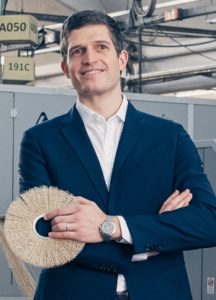Industrial Brush Sector Update Part 1: Manufacturer Capabilities and Focus
By Bob Lawrence
Given that industrial brushes are ubiquitous in numerous industries, from automotive and aerospace to robotics, automation and food processing, it’s not surprising that its market share is enormous in the multi-billion dollar global brush industry. In a 2022 analysis by India-based Maximize Market Research, it was reported that the global industrial brush market size was valued at US $654.72 million, with total revenue expected to grow at an 8.5 percent compound annual growth rate (CAGR) from now to 2029. During that period, the firm projects that the industrial brush market size should reach $1.16 billion. Factors driving this steady, robust growth include increasing demand from the manufacturing industry for brushes used in such applications as surface finishing, cleaning, and deburring and demand for specialized, custom-made brushes for automation and robotic equipment, 3D printing, and other end-user requirements.
None of this is news to those involved in industrial brush manufacturing; they are in the thick of providing products and services to their customers. To gain insight from the ground floor, Brushware sought and received answers to the following questions from those involved in the sector. In Part 1 of 2, the Q&A focuses on manufacturers’ capabilities and market focus. (See Part 2)
What types of industrial brushes does your company manufacture?

Jim Benjamin, President, Precision Brush, Solon, Ohio: Precision Brush Company manufactures metal channel strip brushes in a variety of shapes and sizes. Straight strip and cylinder brushes are the most common, but we also are experts in making inside disks, outside disks, cup brushes and other odd-shaped brushes. These brushes are used in almost every industry and are unlimited in their uses and applications.
CEO Lance Cheney, Braun Brush Company, Albertson, New York: Our company produces a wide array of industrial brushes, including epoxy set, fused, twisted in wire, staple set, wire wound, and wire drawn brushes. Each type is crafted to meet diverse industrial needs, offering durability, precision, flexibility, and strength tailored to specific applications.
Amy Linzmeyer-Jelinek, Sales and Marketing Specialist, Schaefer Brush, Waukesha, Wisconsin: We specialize in crafting industrial brushes tailored to the specific needs and applications of our customers. Our diverse range of brush solutions includes twisted-in-wire, staple-set, and metal back strip brushes, catering to various industrial requirements. Additionally, we excel in developing hand-drawn brushes for specialized applications, as well as intricate engineered brush systems designed for such tasks as cleaning broaches, conveyors, I-beams, channels and more. Our commitment lies in providing customized brush solutions that precisely meet the demands of our customers’ unique applications.
Alessandro Acquaderni, CEO of SITBRUSH, Bologna, Italy: Power brushes, hand scratch brushes, industrial roller brushes, wide-face brushes.
Ken Rakusin, President & Chief Executive Officer, Gordon Brush, USA, City of Industry, California: Gordon Brush produces over 17,000 different kinds of industrial staple set, hand-tied, twisted in wire brushes that are flat, round, cylindrical and all other shapes.
What industries does your company primarily serve with your industrial brushes?
Linzmeyer-Jelinek: We serve a wide array of industries, catering to sectors such as aerospace, power generation, agriculture, automotive, laboratory, food processing, metalworking, HVAC, chemical processing and graphic arts. Our clientele spans across diverse sectors, reflecting the versatility and quality of our products tailored to meet the rigorous standards of professional applications in each industry.

Rakusin: We have a strong presence in the automotive and aerospace industries, where our brushes play a vital role in various manufacturing procedures. Our offerings include a range of products tailored to their specific needs: from our standard hand industrial brushes to those designed for critical ESD (Electro Static Discharge) environments, custom brushes crafted to address specific challenges and even paint and artist brushes. Our market has experienced significant growth thanks to our 13 acquisitions. As a result, we have established strong footholds in the janitorial, food service, electronics, paint and sundries and industrial sectors, where we consistently excel.
Cheney: Our industrial brushes serve a broad spectrum of industries, including automotive detailing, food production, pharmaceutical, aerospace, medical and general industrial sectors. Our products are designed to meet the rigorous standards and diverse needs of these fields.
Benjamin: Most of our products are used in industrial applications where sealing, wiping, agitation, cleaning, moving of product, holding items or any other imaginable application is possible. We have produced over 200,000 unique brushes, and often we are unaware of the specific end uses of these brushes.
Acquaderni: We serve many industries, from automotive to aerospace, from woodworking to primary metal, steel mills, from agriculture, food processing to precision machining.
What materials are commonly used in the manufacturing of your industrial brushes, and what are the advantages of each?
Benjamin: The metal channel is usually galvanized steel or stainless steel, and the brush filament is usually a synthetic such as Polyamide (Nylon) or Polypropylene, although we also can make metal channel strip brushes with natural fibers such as horse hair, Tampico or other animal hairs such as camel or goat hair. We can also make wire brushes using stainless steel, phosphor bronze, brass or steel.
Rakusin: Our biggest material usage is stainless steel, nylon, polypropylene, bristle and horsehair. While we use dozens if not hundreds of other materials, these are the materials that we use the most. Interestingly, none of them can replace another. For instance, stainless steel cannot replace nylon, as it would be too tough and could scratch the surface that the nylon would otherwise clean. Every material is unique in its own way. Gordon Brush maintains an immense variety of materials in our inventory to minimize lead times when we are producing custom brushes.
Cheney: Our industrial brushes are manufactured from a diverse range of materials, each chosen for specific benefits: Nylon offers excellent wear, functionality, and durability with outstanding memory. Polyester provides good wear and functionality, serving as a cost-effective alternative. Polypropylene is known for its weldability and superior chemical resistance. Boar hair is ideal for delicate surfaces, offering durability. Tampico features heat resistance, maintains stiffness when wet and offers chemical resistance. We also incorporate various types of metallic fibers to meet specialized industrial needs.

Linzmeyer-Jelinek: We prioritize meeting our customers’ needs and delivering the best solutions for their specific applications. When it comes to the materials used in manufacturing our industrial brushes, we tailor our choices to ensure maximum effectiveness and durability. For instance, we typically utilize galvanized stem wire to offer cost-effective solutions. However, we understand that certain industries, such as food processing, require higher standards of hygiene. Therefore, we also offer stainless steel options for brushes used in food-grade applications or environments with high moisture exposure upon request. Similarly, our staple-set brushes come with either wood, plastic or foam blocks, depending on the application’s requirements. We recognize that different environments and tasks demand different levels of durability and resilience, and we aim to provide suitable options accordingly. Regarding filament materials, our catalog boasts a diverse range to cater to various needs. This includes natural fibers like horsehair and Tampico, as well as wires made from brass, bronze, steel, tempered wire and a variety of nylon and polypropylene options including antibacterial, antistatic, high temperature resistant and FDA-approved filaments. Each material offers distinct advantages depending on the specific task at hand.
Acquaderni: We use wires of any materials and synthetic abrasive filaments.
What sets your industrial brushes apart from those offered by competitors in terms of quality, durability, and performance?

Gonzalo Martinez, President and CEO, Schaefer Brush, : It’s the culmination of our exceptional technology, talented workforce and over 118 years of industry experience. Our commitment to quality, durability and performance is evident in every aspect of our products and operations. First, our brushes are crafted using state-of-the-art technology, allowing us to maintain precision and consistency throughout the manufacturing process. Almost all our brushes are designed and produced by our teams in Waukesha, Wisconsin, and Chicago, Illinois. This ensures that each brush meets the highest standards of quality and performance. Secondly, our team of skilled professionals brings decades of collective expertise to the table. Their dedication to innovation and attention to detail result in brushes that are not only durable but also optimized for maximum effectiveness in a wide range of applications. Finally, our long-standing presence in the industry speaks volumes about our commitment to excellence. Over the years, we have refined our processes, honed our skills, and earned the trust of customers worldwide.
Cheney: What distinguishes our industrial brushes from competitors’ offerings are the aspects of quality, durability and performance, which are deeply embedded in our design and manufacturing process. Our philosophy is that brushes designed with a specific application in mind significantly outperform those intended for general use or retrofitted for a particular task. Durability is not a one-size-fits-all criterion; it is tailored to the application’s requirements. We have engineered brushes for both extremes: highly specialized brushes intended for a single-use application where precision is paramount, and on the other end, brushes designed for environments that are difficult to access and require longevity, ensuring they last for years. This bespoke approach allows us to meet and exceed our clients’ expectations across a variety of industries.
Benjamin: Precision Brush Company has great customer service, quoting capabilities and machinery to deliver brushes on time. The employees are a big part of this process and we are lucky to have a great office staff and manufacturing team that can back them up.
Rakusin: Our customers have learned that we provide them with brushes that meet, or usually exceed their expectations. Balancing quality, durability, performance and pricing are challenges that all manufacturers have to deal with. We may or may not be the least expensive, but delivering a durable, quality brush on time keeps our customers returning for more.
Regarding your manufacturing process, what unique technologies are utilized?
Rakusin: For the last 20-25 years, Gordon Brush has continued to invest in new, modern CNC equipment that enables us to produce products rapidly in the most automated ways possible. We’ve been on a buying spree over the last four years or so, investing about $6 million in new machinery.
Acquaderni: We use quite a few of the technologies and machinery from the suppliers exhibiting at World Brush Expo 2024.
Gonzalo Martinez, President and CEO, Schaefer Brush: In our manufacturing process, we leverage cutting-edge technologies tailored to the production of twisted-in-wire, staple set and metal back strip brush solutions. Our commitment to innovation drives us to continually invest in advanced equipment and techniques to enhance operational efficiencies and product quality. Some of the technologies we utilize include, state-of-the-art automated machinery for precision manufacturing of twisted-in-wire, staple set brushes and strip brushes. These machines ensure consistent product quality, reduce manual labor and optimize production throughput. We harness data analytics tools to monitor and analyze various aspects of the manufacturing process, such as machine performance, material usage and quality control metrics. This data-driven approach enables us to identify opportunities for optimization, streamline workflows and minimize waste, ultimately improving overall operational efficiencies. By embracing these technologies, we not only maintain our competitive edge in the industrial brush market but also drive continuous improvement in product quality, efficiency and innovation, ultimately delivering superior value to our customers.
Benjamin: Precision Brush Company probably has more capacity and machinery than most other strip brush manufacturers. We mostly design and manufacture our own equipment which allows us to keep costs lower and capacity opportunities greater.

Cheney: In our manufacturing process, we employ several unique technologies to create our specialized brushes. Our extensive use of epoxy set techniques, especially for individual strand set brushes, caters to the stringent requirements of the food and pharmaceutical industries. We stand out in the market as one of the few manufacturers capable of producing cylindrical and bottle brushes through wire winding construction methods. Additionally, we are the sole provider of completely fused tube and pipe brushes, a testament to our innovative approach. A significant portion of our production involves custom-designed and engineered products. For these, we leverage our in-house 3D printing and CNC machining capabilities, enabling precise and efficient fabrication tailored to our clients’ specific needs.
How does your company ensure the quality and consistency of your industrial brushes?
Benjamin: Quality has been a major goal and one of our core values since the beginning of the company in 1951. We have great employees and systems to check that limit mistakes. We very rarely get any brushes back because they were made wrong or had quality defects. If we do get any complaints it is usually because the shipment was lost by a carrier.
Erin Clay, Quality Manager, Schaefer Brush: Ensuring quality and consistency in our industrial brushes is a top priority at Schaefer and Gornell. We integrate various elements of quality management systems into our operations to achieve this objective. These include thorough drawing, design reviews, established tolerancing for different product lines and documented quality checks. Additionally, we foster a culture of open communication within our team, encouraging everyone to voice concerns and suggestions. Continuous improvement is ingrained in our practices, ensuring that we consistently strive to enhance our processes and products.
Cheney: Our company upholds the highest standards of quality and consistency in our industrial brushes through a culture where every team member is accountable for quality. Each individual takes ownership of the product quality that passes through their hands, embracing a proactive stance towards maintaining our standards. Rather than assigning blame for errors, we focus on collaborative problem-solving to prevent recurrence. This approach ensures that our brushes meet the stringent demands of our diverse clientele, maintaining our reputation for excellence.
Rakusin: Gordon is an ISO 9001:2015 certified company and we work hard to ensure that our brushes are made properly the first time and every time. This process has been fine-tuned over our 73 years in business.
See Part 2 of the Industrial Brush Q&A.
Company Websites
Gordon Brush | Precision Brush | Schaefer Brush | Braun Brush | SIT Brush


